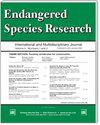历史生态学的全球研究重点为保护提供信息
IF 2.9
2区 环境科学与生态学
Q2 BIODIVERSITY CONSERVATION
引用次数: 0
摘要
ABSTRACT: 历史生态学利用广泛的信息来源和方法来洞察生态和社会变迁,尤其是过去∼12000 年间的变迁。虽然其结果通常与保护和恢复相关,但来自不同学科、环境和地域的洞察力往往仍处于孤立或代表性不足的状态,限制了其潜力的充分发挥。在这里,在六大洲和多个群岛的海洋、淡水和陆地环境中工作的学者和实践者综合了历史学、人类学、古生物学和生态学领域的知识,目的是描述历史生态学的全球研究重点,以影响保护工作。我们采用结构化决策过程来确定和解决 4 个关键优先领域的问题:(1) 方法和概念,(2) 知识共同生产和社区参与,(3) 政策和管理,以及 (4) 气候变化影响。这项工作强调了历史生态学在以下方面发展和成熟的方式:使用新的信息来源;努力超越萃取研究实践,走向知识共同生产;以及应用于包括气候变化在内的管理挑战。我们展示了这一领域如何将跨学科的研究人员聚集在一起,如何将学术界与实践者联系在一起,如何让社区参与进来,以创造和应用过去的知识来应对我们共同未来的挑战。本文章由计算机程序翻译,如有差异,请以英文原文为准。
Global research priorities for historical ecology to inform conservation
ABSTRACT: Historical ecology draws on a broad range of information sources and methods to provide insight into ecological and social change, especially over the past ∼12000 yr. While its results are often relevant to conservation and restoration, insights from its diverse disciplines, environments, and geographies have frequently remained siloed or underrepresented, restricting their full potential. Here, scholars and practitioners working in marine, freshwater, and terrestrial environments on 6 continents and various archipelagoes synthesize knowledge from the fields of history, anthropology, paleontology, and ecology with the goal of describing global research priorities for historical ecology to influence conservation. We used a structured decision-making process to identify and address questions in 4 key priority areas: (1) methods and concepts, (2) knowledge co-production and community engagement, (3) policy and management, and (4) climate change impacts. This work highlights the ways that historical ecology has developed and matured in its use of novel information sources, efforts to move beyond extractive research practices and toward knowledge co-production, and application to management challenges including climate change. We demonstrate the ways that this field has brought together researchers across disciplines, connected academics to practitioners, and engaged communities to create and apply knowledge of the past to address the challenges of our shared future.
求助全文
通过发布文献求助,成功后即可免费获取论文全文。
去求助
来源期刊

Endangered Species Research
BIODIVERSITY CONSERVATION-
CiteScore
5.50
自引率
6.50%
发文量
38
审稿时长
31 weeks
期刊介绍:
ESR is international and interdisciplinary. It covers all endangered forms of life on Earth, the threats faced by species and their habitats and the necessary steps that must be undertaken to ensure their conservation. ESR publishes high quality contributions reporting research on all species (and habitats) of conservation concern, whether they be classified as Near Threatened or Threatened (Endangered or Vulnerable) by the International Union for the Conservation of Nature and Natural Resources (IUCN) or highlighted as part of national or regional conservation strategies. Submissions on all aspects of conservation science are welcome.
 求助内容:
求助内容: 应助结果提醒方式:
应助结果提醒方式:


